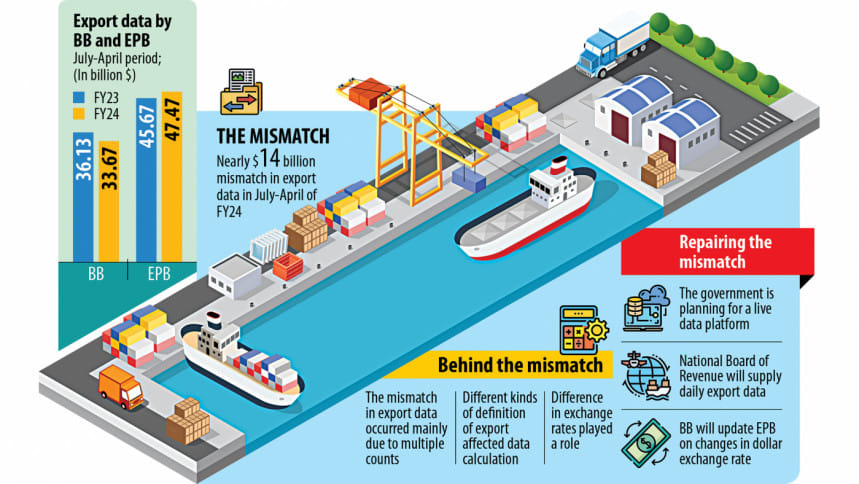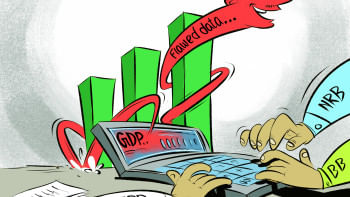Bangladesh moves to put export data system in order

The government has initiated moves to correct the system to calculate national data in oder to avoid the repetition of the shock after the central bank reported a massive statistical mismatch linked to exports.
As part of the process, it decided to introduce a platform to publish real-time data on the country's sales in global markets in order to ensure data accuracy and make policies evidence-based.
The primary decision of putting in place the live data platform was taken at a meeting at the Export Promotion Bureau (EPB) in Dhaka yesterday.
Representatives from the EPB, the Bangladesh Bank, the National Board of Revenue (NBR), the Bangladesh Bureau of Statistics, and the Bangladesh Trade and Tariff Commission participated in the meeting.
It seemed that this was the first meeting since Wednesday when the central bank's corrected figures on exports took many by surprise. Analysts have even termed it as one of the biggest shocks in the financial sector of Bangladesh in recent times.
BB data showed that actual exports in July-April of fiscal year 2023-24 were nearly $14 billion below the shipment value of goods published by the EPB earlier.
This prompted the government to make the export data uniform as the release of shipment figures computed by various agencies of the government is creating confusion.
"The platform has been planned as the data mismatch is giving wrong signal to policymakers," said a senior official of the EPB who attended the meeting. He, however, could not say immediately when the platform would be rolled out and how it would be run as the idea is still in its infancy.
The EPB will brief the commerce ministry shortly about the issue, the official said, adding that funds would be needed for the creation of such a modern data platform.
Earlier this week, State Minister for Commerce Ahasanul Islam Titu told The Daily Star that a new project will be taken soon for the real-time export data platform.
Under the planned platform, the NBR will supply the daily export data to the EPB, and the BB will compute it on the basis of the real-time exchange rate.
This is because the customs department sends the figures on the volume of exported goods in the local currency, and the EPB converts them into US dollars, the official said.
However, a single data platform will remove all confusion as figures will be provided in real-time and calculated in a scientific manner, he said.
"This is a step in the right direction," said Ashikur Rahman, principal economist at the Policy Research Institute of Bangladesh.
He said there are some debates about what data should be considered as exports.
"It should be based on global standards. In order to do so, the International Monetary Fund can be involved in this process. If the IMF sends a statistical mission, it can help the government manage data better."
Rahman said after the recent export data shock, data governance has become a major issue for Bangladesh since it has raised questions about many other numbers such as gross and net foreign exchange reserves.
"So, there is no alternative to giving importance to the data management, data governance and synchronisation."
"The initiative will really be a good move," said Selim Raihan, executive director of the South Asian Network on Economic Modeling.
He described the difference between the figures released by the EPB and the BB as one of the largest data scams.
The EPB official also said the gap between the real export sum and the provisional export data was as high as $4 billion annually in the past. But this time, the gap climbed to $14 billion because of multiple counting of the goods shipped.
The customs department of the NBR also counted the value of the samples exporters send to prospective buyers free of cost under the existing export policy.
Moreover, last year nearly $1.7 billion worth of local imports by the factories inside the export processing zones were taken into account by the EPB while computing Bangladesh's sales in the global markets. However, the central bank does not include the amount in the final export data.
Currently, the EPB processes the export data after receiving it from the customs department. The customs department sends the data based on the shipping bills of merchandise, the official of the EPB said.
However, a lot of changes may take place after products leave the country. For example, sometimes goods are not exported at all, but the data is still considered by the customs department and is sent to the EPB.
Both Raihan and Sayema Haque Bidisha, a professor of economics at the University of Dhaka, said the government should first identify the reasons behind the data discrepancy.
"One way of checking trade data is to verify it from the importers' end," Bidisha said. "It is also important that data is regularly reported to the UN Comtrade."
The United Nations Comtrade database aggregates detailed global annual and monthly trade statistics by product and trading partner for use by governments, academia, research institutes, and enterprises.
"Finally, it is important to know the source of mistakes," said Prof Bidisha.
Various explanations can be there, she said.
"It can be over-invoicing by exporters. Was it misreporting on the part of the EPB? Or it may be that a part of export earnings was not brought to the country."
Raihan questioned whether the data mismatch had been caused by the absence of technological skills or a deliberate reporting of inflated data.
"If the reporting was deliberate, the planned platform will not work at all," he said, calling it one of the biggest data scams.
Raihan said the issue can't be taken lightly.
"For the new platform to work effectively, the government must take initiatives to develop the skills of officials who will operate it."


 For all latest news, follow The Daily Star's Google News channel.
For all latest news, follow The Daily Star's Google News channel. 












Comments